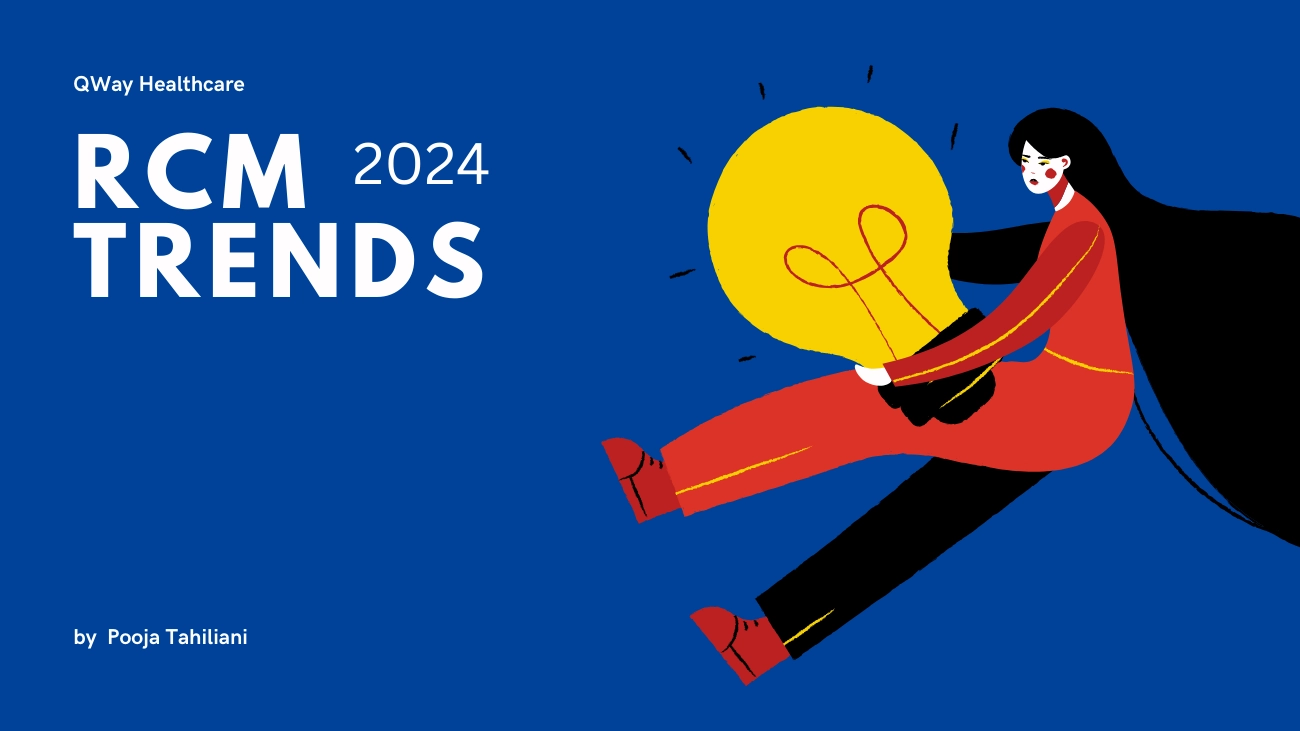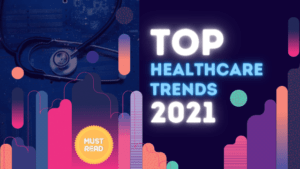In the dynamic world of healthcare, technology stands as a key driver of progress, continuously reshaping patient care. The last ten years have witnessed impressive advancements in healthcare technology, and as we set our sights on 2024, we brace for even more profound transformations. These upcoming trends bear the promise of revolutionizing medical practices, elevating patient outcomes, and optimizing the efficiency and availability of healthcare services. Within this article, we delve into the healthcare technology trends for 2024 poised to leave their mark on the industry, bringing empowerment to healthcare professionals and delivering benefits to patients worldwide.
“The global revenue cycle management market value was USD 121.8 billion in 2023, driven by the increasing volume of patient data across the globe. The market size is anticipated to grow at a CAGR of 12.2% during the forecast period of 2024-2032 to achieve a value of USD 342.6 billion by 2032.”
2024 Healthcare Technology Trends
Artificial Intelligence (AI)
AI is already being used in some RCM processes, such as claims coding and pre-certification. In 2024, we can expect to see AI being used even more extensively in RCM, to help with tasks such as:
Denial management: AI can be used to identify and analyze denied claims, and to help providers develop strategies for appealing denials. For example, AI can be used to identify common patterns in denied claims, and to develop automated workflows for appealing these claims.
Payment posting: AI can be used to automate the process of posting payments to patient accounts. This can help to reduce the workload on RCM staff and to improve the accuracy of payments.
Patient engagement: AI can be used to develop chatbots and other tools that can help patients understand their bills and make payments. This can help to improve the patient experience and to reduce the number of patient inquiries.
Cloud-based RCM solutions
Cloud-based RCM solutions are becoming increasingly popular, as they offer a number of advantages, such as:
Scalability: Cloud-based solutions can be scaled up or down to meet the needs of any size healthcare organization. This can be especially beneficial for organizations that are experiencing rapid growth or that have seasonal fluctuations in their volume of claims.
Accessibility: Cloud-based solutions can be accessed from anywhere, with an internet connection. This can be helpful for organizations with remote staff or that need to access their RCM system from multiple locations.
Security: Cloud-based solutions are typically very secure, and they offer a number of features to protect patient data. This is important for healthcare organizations, which are subject to strict data privacy and security regulations.
Interoperability
Interoperability is the ability of different systems to communicate with each other. In the context of RCM, interoperability is important because it allows providers to exchange data with insurers and other stakeholders electronically. This can help to streamline the RCM process and reduce errors.
For example, interoperability can allow providers to submit claims to insurers electronically, and to receive electronic remittances from insurers. This can help to reduce the time it takes for providers to receive reimbursement for their services.
Data Analytics
Data analytics is the process of collecting, analyzing, and interpreting data. In the context of RCM, data analytics can be used to identify trends, patterns, and outliers. This information can then be used to improve the efficiency and effectiveness of the RCM process.
For example, data analytics can be used to identify common reasons for denials and to develop strategies for reducing the number of denials. Data analytics can also be used to identify areas where the RCM process can be streamlined and to measure the performance of the RCM process over time.
Cybersecurity and Data Protection
In the realm of patient data management, cyber security, and data protection assume paramount importance within the domain of RCM systems. It is imperative for healthcare entities to take meticulous precautions in safeguarding against the ever-evolving landscape of cyber risks. This includes the implementation of state-of-the-art encryption, multi-factor authentication, and vigilant intrusion detection mechanisms. Additionally, healthcare providers are expected to place a heightened emphasis on cyber security training to mitigate the risks of inadvertent data breaches.
Within the continually advancing digital healthcare landscape, the significance of robust data security and privacy cannot be overstated. Healthcare institutions are gearing up to make substantial investments in cutting-edge cyber security technologies. These proactive measures serve as a robust defense against potential data breaches and cyber threats, highlighting the unwavering commitment to preserving the integrity of patient information.
Some of the key points of concern to be put into action:
- Implement automated prior authorization workflows to streamline the process, reduce errors, and boost efficiency.
- Improve patient access through technological solutions like tele-medicine and self-check-ins.
- Reduce denials and revenue loss by harnessing the power of AI and data analytics to identify the root causes of denials and develop proactive strategies to avert them.
- Strengthen appeals processes to reclaim lost revenue due to denials.
How healthcare organizations can implement these key points:
1. Automated prior authorization workflows
- Map out your practice’s PA process and identify areas that can be automated or streamlined.
- Integrate technological solutions like electronic forms and templates to automate data entry and ensure proper data capture.
- Use workflow management solutions that allow you to assign tasks, send notifications, and track prior authorization requests.
2. Improved patient access
- Implement tele-medicine solutions to provide outpatient services to patients remotely.
- Develop self-check-in solutions to reduce patient wait times and improve patient satisfaction.
- Invest in language translation services to remove language barriers and improve patient access to care.
3. Reduced denials and revenue loss
- Use AI and data analytics to identify the root causes of denials.
- Develop proactive strategies to address the root causes of denials.
- Implement automated processes for submitting and tracking appeals.
4. Strengthened appeals processes
- Review your current appeals process and identify areas for improvement.
- Develop a comprehensive appeals process that includes clear deadlines and communication protocols.
- Train your staff in the appeals process and ensure that they have the resources they need to file successful appeals.
How healthcare providers can prepare for 2024 RCM Trends?
Healthcare providers can prepare for the trends in healthcare technology for RCM that will continue in 2024 by:
- Investing in AI-powered RCM solutions: AI-powered RCM solutions can help providers to automate and streamline their RCM processes. This can lead to significant cost savings and efficiency gains.
- Migrating to cloud-based RCM solutions: Cloud-based RCM solutions offer a number of advantages, such as scalability, accessibility, and security. Providers should migrate to cloud-based RCM solutions to take advantage of these benefits.
- Ensuring interoperability: Providers should ensure that their RCM systems are interoperable with the systems of their insurers and other stakeholders. This will help to streamline the RCM process and reduce errors.
- Investing in data analytics: Providers should invest in data analytics solutions to analyze their RCM data and identify areas where they can improve. This can lead to significant cost savings and efficiency gains.
The RCM industry is constantly evolving, and new trends are emerging all the time. In 2024, we can expect to see increased automation, cloud-based RCM solutions, data analytics, automated prior authorization workflows, improved patient access, reduced denials, and revenue loss, and strengthened appeals processes. Healthcare organizations that embrace these trends will be well-positioned to improve their RCM processes, increase patient access, and reduce revenue loss.
These trends are expected to have a significant impact on the RCM industry in 2024 and beyond. Healthcare organizations that embrace these trends will be well-positioned to improve their RCM processes, increase patient access, and reduce revenue loss.
About QWay Healthcare:
QWay employs certified coders who have expertise in the specific specialization. With their skill and understanding, they can address the problems, maintain key performance standards based on payer-specific documentation, use the proper medical codes and modifiers in accordance with AMA rules, and implement CCI (Correct Coding Initiative) amendments. Our coding team also carries out coding-related denial analysis, and code corrections and resubmits the claims back to payers to improve reimbursements.




